Gareth Bale: How Real Madrid superstar became a Wales legend
- Published
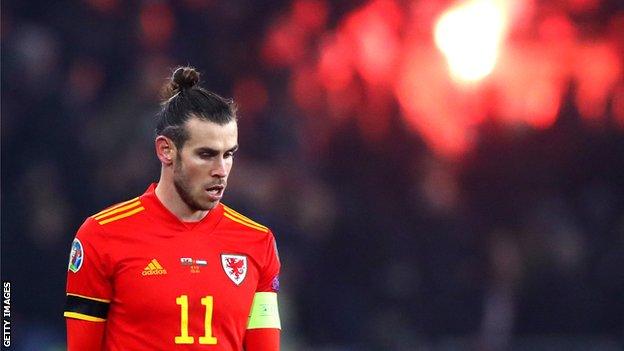
Gareth Bale has scored 36 goals for Wales - more than anyone other male player - in his 99 appearances
This piece (which has been modified) was originally published in June 2020 as part of BBC Sport's Gareth Bale day.
Some players can bring a game to life; special ones can inspire a team or light up a tournament. Then there are those whose greatness can elevate an entire nation to new heights. Gareth Bale is one.
After scoring the decisive goal in Real Madrid's 2014 Champions League final victory, his first thought at the final whistle was to grab the nearest Wales flag and give the red dragon what was arguably its largest ever global audience.
Real triumphed again in 2016, 2017 and 2018, when Bale scored with a jaw-dropping overhead kick to defeat Liverpool. Once more he left the pitch with his country's flag draped around his shoulders.
For most players, winning club football's most coveted trophy four times - and scoring one of the most spectacular goals in European Cup final history - would represent an unsurpassable career high.
But Bale is different. For him, playing for Wales means more. He says so himself.
Already his country's all-time leading goalscorer, the 30-year-old has carried his team through lean spells and repeatedly come to Wales' rescue in their hour of need.
And as Wales dragged themselves up the world rankings and a nation started to believe, it was Bale who led the charge to qualify for a first major tournament in 58 years.
Euro 2016 was Wales' moment in the sun. Their journey to the semi-final was not only the football team's greatest achievement, but a voyage which gave Wales, as a nation, the recognition it had never enjoyed before.
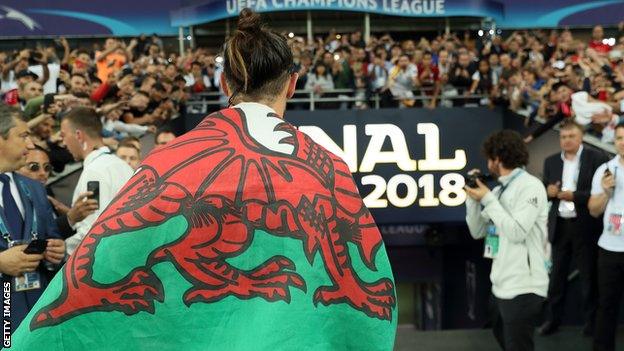
Gareth Bale scored twice and was named man of the match in Real Madrid's 2018 Champions League final win over Liverpool

Bale the 'shy and quiet' teenager
Bale has long led Wales by his deeds on the pitch and the Real Madrid forward now wears the armband as well.
His development as a leader has taken time, as has his physical progression from a boyish Wales debutant to his current muscular frame.
Bale was a 16-year-old left-back when he was first called up in May 2006, having only played his first two matches of senior football for Southampton a month earlier.
"At the beginning, he was very shy," says Robert Earnshaw, Wales' striker at the time.
"When you're a young man coming into an environment with lots of senior players, you're trying to work out what to do, what your level is, and you could tell that was the case with him.
"But at the same time, you could see him being himself, what he wanted to be in his mind.
"He was quiet but, once he played, you could see him get more and more confident."
Bale was in Wales' squad for an uncapped friendly against a Basque XI but, having not featured in Bilbao, he returned home to help the Under-21s beat Estonia in Wrexham.
Then, in what now seems like a symbolic transition, Bale was restored to the senior squad after Ryan Giggs was injured.
At 16 years and 315 days, Bale's substitute appearance against Trinidad and Tobago made him Wales' youngest international, and he marked the occasion by assisting Earnshaw for the winning goal.
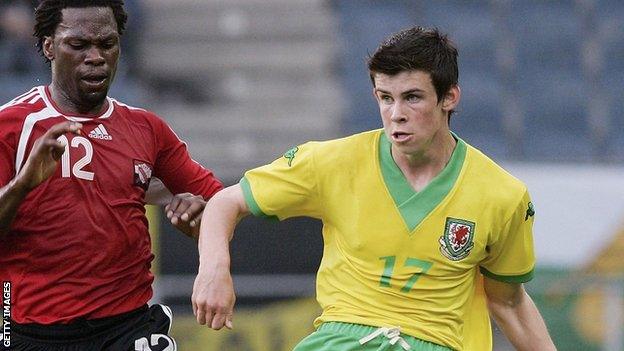
Gareth Bale replaced David Vaughan to make his Wales debut against Trinidad and Tobago in Graz, Austria, in 2006
"First of all I thought 'Well done, kid'," Earnshaw recalls with a broad grin.
"I'd seen him a bit in training but you never know how a young player will react until you see them in a game.
"Instantly, when he picked up the ball and got his first assist for me, when he went on his dribble, you could see his ability.
"That's when I thought 'OK, he sees things, this is a good player'."
Now Bale was up and running, he started to relax.
"He was joking, laughing - he's always been one to have a laugh," Earnshaw adds.
"At times you could see Gareth's cheekiness. Then you could tell he was comfortable at that level.
"You see them grow as a person and a player. That's a really special thing."

Bale's rapid - sometimes bumpy - rise
Bale gave a further glimpse of what was to come on his third Wales appearance in September 2006, scoring with a beautiful curling free-kick in an otherwise dismal Welsh display as they were thrashed 5-1 at home by Slovakia.
That was a snapshot of his early Wales years: moments of individual brilliance as fleeting rays of hope for a mediocre team.
At club level, Bale's ascent was rapid but not without setbacks.
Tottenham fought off competition from Manchester United to sign him in 2007 but, after early promise, he struggled with injuries and a statistical quirk that showed he had failed to win a Premier League game over the course of two years and 24 fixtures.
Harry Redknapp, Spurs' manager at the time, admitted he was reluctant to select Bale for fear the young left-back was cursed.
But once Bale broke that drought, he did not look back. A series of electrifying attacking displays saw him move up to the left wing, where he tormented defenders across Europe.
Brazil right-back Maicon was his most notable victim, as Bale scored three goals and provided two assists during Spurs' two matches against Inter; confirmation of the Welshman's arrival at the top level.
Once the legendary Luis Figo hailed Bale's performances as "amazing", it was no surprise when the Portuguese's former club, Real Madrid, showed an interest.
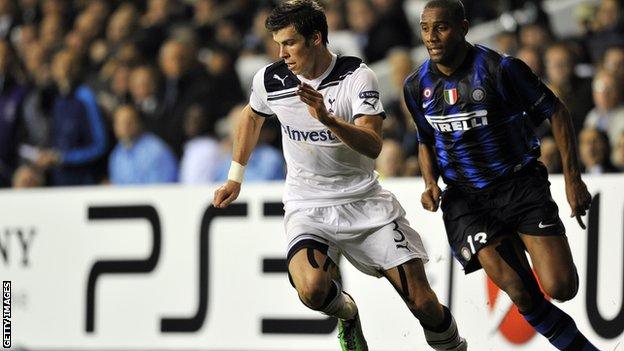
Gareth Bale, leaving Maicon in his wake, followed up a hat-trick in a losing cause at the San Siro with an even better display as Spurs beat Champions League holders Inter in November 2010
Bale was voted PFA Players' Player of the Year in 2011 and again two years later, this time alongside the PFA Young Player of the Year and Football Writers' Association Player of the Year awards - making him only the second player to win all three in the same season. Cristiano Ronaldo was the other.
Real united the two in 2013, signing Bale for a then world-record fee of £85m, eclipsing the £80m they had paid for Ronaldo four years earlier.
Protracted negotiations meant Bale's presentation to fans at the Bernabeu came close to the transfer deadline, as well as Wales' squad meeting before their game in Macedonia.
Many, particularly in Madrid, assumed Bale would stay with his new club. Even some in Wales were concerned, casting their minds back to Giggs' international career and his perceived prioritising of Manchester United over his country.
But Bale boarded a private jet and was soon back home in Cardiff with the rest of the Wales squad.
He was setting the tone, emphasising his commitment to his country and making the fair but firm point to his new employers, however mighty they may be, that he would not change for anybody.

Bale the under-fire icon
Bale started strongly at Real, scoring on his debut and finishing his first season with 22 goals.
Flourishing at a club of that size alongside some of the world's leading players seemed to give him a new swagger, which was evident when he returned to Wales for a friendly match against Iceland in March 2014.
The fact he was there at all was another reminder of his determination to play for Wales, and he demonstrated how his improvement at Real might benefit his country with an extraordinary goal.
Picking up possession deep in his own half, Bale was forced off the pitch by an attempted foul but he stayed on his feet, powered forward and fired into the bottom corner.
Remarkably, he repeated the trick for Real in the Copa del Rey final against arch rivals Barcelona a month later, again starting from his own half and beating an opponent with strength and pace before applying the match-winning finish.
That was Bale's first trophy with Real and within weeks he had his second, scoring in the Champions League final win over Atletico Madrid. Everything seemed to be going perfectly.
But like a child growing bored of a new toy, the Bernabeu crowd eventually turned.
Bale managed 18 goals in his second season and helped his team win three further Champions League titles as well as a La Liga championship in 2017.
However, increasingly frequent injuries affected his form, and even the slightest dip in performance was seized upon by the Spanish media and Real's fans.
The attacks became personal, with some criticising his Spanish and others - even team-mates such as goalkeeper Thibaut Courtois - mocking him for playing golf and staying in rather than socialising at night.
"I remember the original Ronaldo getting stick off Real Madrid fans. I remember Cristiano getting stick early doors," Wales manager Ryan Giggs said at the time.
"It's that kind of club. It's a club like no other where the white handkerchiefs come out if they don't like you. That's just the way it is."
Last year, the animosity reached a stage where Real manager Zinedine Zidane said it would be "best for everyone" if Bale left.
Although Bale ignored the Bernabeu jeers and stayed in Madrid, his opportunities to play with Wales felt increasingly like an escape from the hostility - and Wales were happy to offer that haven.
While Welsh supporters loved Bale for all his glorious successes with club and country, they seemed to grow even closer to him because of this turbulent period.
Wales fans felt protective of him, one of their own.
Bale cherishes the bond he has with those he dubbed the "Red Wall", and that was clearer than ever when he took aim at his critics this season.
When Spanish media questioned Bale's return to training with Wales after an injury had ruled him out for Real, the club's former striker and director of football Predrag Mijatovic claimed Bale prioritised Wales - and even his interest in golf - over his club side.
That prompted one Wales fan to print a flag, which he displayed at November's Euro 2020 qualifier against Hungary, reading: "Wales. Golf. Madrid. In that order."
After Wales beat Hungary to seal qualification, Bale was handed the banner and was pictured holding it alongside his team-mates.
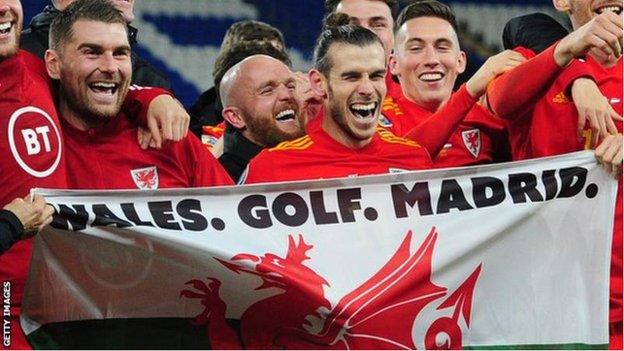
Gareth Bale and his Wales team-mates celebrate Euro 2020 qualification with the now infamous banner
It did not go down well. In fact, Spanish newspaper Marca's response was the headline: "Disrespectful. Misguided. Ungrateful. In that order."
Again Bale brushed off the criticism, pointing out it was a joke and that he was hardly going to stop celebrating after Wales had qualified for only a third major tournament in their history.
Besides, he simply did not care. When Real returned to training after the season was halted because of coronavirus, a group of players struck a pose for a photographer. Among them was Bale, mimicking a golf shot.
In Wales, the whole episode only enhanced his popularity.
Supporters have plenty of reasons to adore their country's greatest player but perhaps what gives them that special sense of kinship with Bale is that they can identify with him; that they can see themselves, the Welsh fan, in him.

Bale the national hero
While Bale has produced a vast body of work to establish his legendary status, his masterpiece was Euro 2016.
He was one of the chief proponents of Wales' motto for that campaign, 'Together Stronger', so there is no chance he would accept more credit than any of the team-mates he referred to as "brothers" in France.
Even when you consider the significant contributions of all players and staff, however, Bale still stands out.
Laying the foundations for this success took years. There were growing pains under John Toshack and an evolution in style under Gary Speed, whose death profoundly affected a young Wales squad but also brought them closer through a shared grief.
Chris Coleman, a friend of Speed's, took on the project and, although he struggled initially, he knew he had one of Wales' finest generations of players at his disposal.
With Ben Davies, Joe Allen, Aaron Ramsey and others by Bale's side, Wales now had the strength in depth to allow their talisman to shine brighter.
In qualifying for Euro 2016, Bale scored seven and assisted two of Wales' 11 goals. Three of those were winning goals, as time and again he proved his country's saviour.
Qualifying itself was a seismic achievement for Wales, ending their 58-year absence from major tournaments and banishing a history of excruciating near misses.
Then the tournament in France gave Wales a golden summer which exceeded their most outlandish dreams.
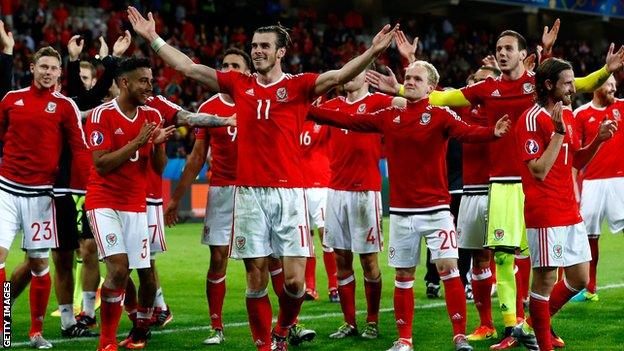
Wales is the smallest nation by population to have a football team reach the semi-finals of a European Championship
Those in Bordeaux on 11 June 2016 will never forget the sunshine, the stirring Welsh anthem, the disbelieving faces in red shirts, pinching themselves to check that this really was happening
It was Bale who gave them the first taste of that rare ecstasy of watching your country score in a major championship; his free-kick against Slovakia sending the Red Wall in the stadium - and in fan parks up and down Wales - into raptures.
He scored with another free-kick against England and then again from open play in the 3-0 demolition of Russia under lilac skies in Toulouse, for many the single most joyous match of their lives.
Bale did not score in the knockout stages but he created the second-round winner against Northern Ireland, and he played his part in the quarter-final victory over Belgium, the greatest moment in Welsh football history.
That is what Bale has done throughout his Wales career: produce the moments which provide a nation with a lifetime's worth of memories.
But his tournament was about more than football.
Bale emerged as the team's statesman, speaking passionately about Welsh pride and with articulate confidence about his nation's blossoming on this grand stage.
Now set to win his 100th Wales cap, Bale will be Wales' great ambassador once more, a national hero.